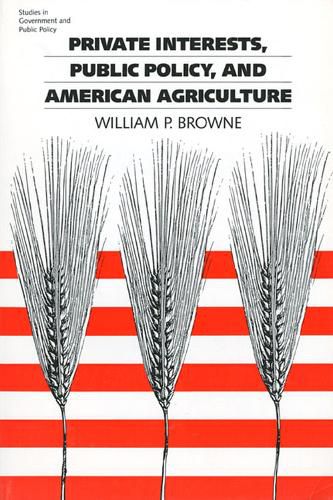Readings Newsletter
Become a Readings Member to make your shopping experience even easier.
Sign in or sign up for free!
You’re not far away from qualifying for FREE standard shipping within Australia
You’ve qualified for FREE standard shipping within Australia
The cart is loading…






Agriculture is at a critical juncture. The Food Security Act of 1985, which was intended to reduce surpluses by making American farm products more competitive in world markets, has not yet succeeded. Food imports have outstripped food exports. Huge grain surpluses continue to pile up. Because many farmers and economists fault federal agricultural policies for the current predicament, this book examines how recent policies, like the 1985 law, have been made and focuses on the key role that private interests play in the policy process. Not only does Browne give us the first comprehensive study of all of the organized interests at work in agricultural policymaking, but he also makes an important contribution to understanding the interaction of organized interests in the American political process. His book should appeal to a wide audience composed of those interested in agriculture, policy process, and interest group behavior. In the early 1980s, 128 separate organizations employed Washington-based lobbyists who regularly worked to influence agricultural policies. Many other organizations periodically lobbied in agriculture. The general farm organizations have been joined by commodity organizations, trade associations, corporate spokesmen, farm activists, industry lobbyists, consumer groups, environmentalists, and advocates of a variety of food-related programs. Long gone are the days when the farm bloc preordained policy outcomes and when students of American politics looked upon agriculture as a classic example of the iron triangle or self-governing subsystem of interest groups, bureaucrats, and legislators. Now the policymaking process is fragmented by the clamor from competing organized interest groups, and the policy makers responded by fashioning piecemeal policy with no seeming thought to unity of purpose. In an attempt to throw light on what actually happens in Washington, Browne explains what groups and interests are active in agricultural policymaking, what strategy and tactics they employ, and why some have more influence than others. One of Browne’s conclusions is that a surprising number of agricultural issues are uninfluenced by the interest groups because they ignore them.
For nearly a decade William P. Browne has studied the major farm organizations, congressional hearings and records related to agricultural issues, and the American Agricultural Movement. But perhaps his richest source of information has been extensive interviews with lobbyists, executives, and grassroots activists during and just after the 1985 farm bill debates. In the course of his research, Browne sought to learn how interest groups behave in deciding their policy priorities and how this behavior actually relates to influence over the desired policy outcomes.
$9.00 standard shipping within Australia
FREE standard shipping within Australia for orders over $100.00
Express & International shipping calculated at checkout
Agriculture is at a critical juncture. The Food Security Act of 1985, which was intended to reduce surpluses by making American farm products more competitive in world markets, has not yet succeeded. Food imports have outstripped food exports. Huge grain surpluses continue to pile up. Because many farmers and economists fault federal agricultural policies for the current predicament, this book examines how recent policies, like the 1985 law, have been made and focuses on the key role that private interests play in the policy process. Not only does Browne give us the first comprehensive study of all of the organized interests at work in agricultural policymaking, but he also makes an important contribution to understanding the interaction of organized interests in the American political process. His book should appeal to a wide audience composed of those interested in agriculture, policy process, and interest group behavior. In the early 1980s, 128 separate organizations employed Washington-based lobbyists who regularly worked to influence agricultural policies. Many other organizations periodically lobbied in agriculture. The general farm organizations have been joined by commodity organizations, trade associations, corporate spokesmen, farm activists, industry lobbyists, consumer groups, environmentalists, and advocates of a variety of food-related programs. Long gone are the days when the farm bloc preordained policy outcomes and when students of American politics looked upon agriculture as a classic example of the iron triangle or self-governing subsystem of interest groups, bureaucrats, and legislators. Now the policymaking process is fragmented by the clamor from competing organized interest groups, and the policy makers responded by fashioning piecemeal policy with no seeming thought to unity of purpose. In an attempt to throw light on what actually happens in Washington, Browne explains what groups and interests are active in agricultural policymaking, what strategy and tactics they employ, and why some have more influence than others. One of Browne’s conclusions is that a surprising number of agricultural issues are uninfluenced by the interest groups because they ignore them.
For nearly a decade William P. Browne has studied the major farm organizations, congressional hearings and records related to agricultural issues, and the American Agricultural Movement. But perhaps his richest source of information has been extensive interviews with lobbyists, executives, and grassroots activists during and just after the 1985 farm bill debates. In the course of his research, Browne sought to learn how interest groups behave in deciding their policy priorities and how this behavior actually relates to influence over the desired policy outcomes.